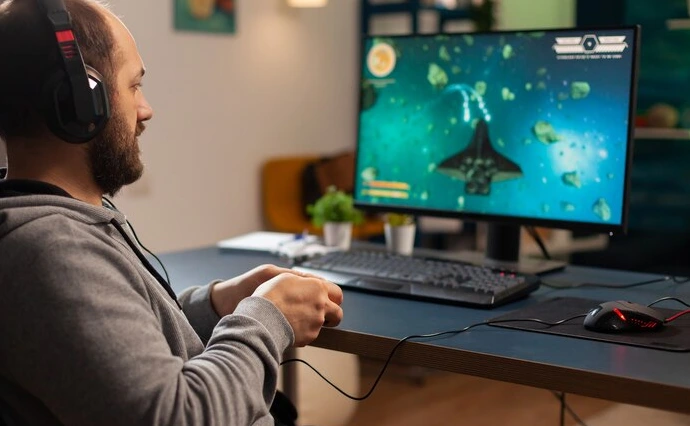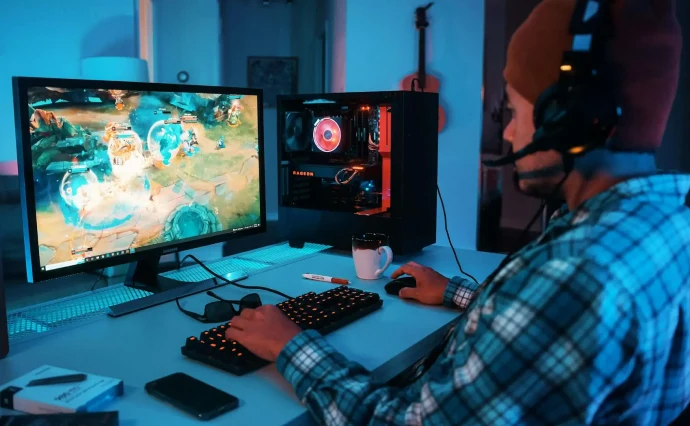Introduction to Gaming Monitor Setup Guide
Setting up a gaming monitor can greatly improve your gaming experience. A good setup is not just about the monitor itself, but also about how you use it. In this Gaming Monitor Setup Guide, we will discuss why a proper setup is important and how to choose the best monitor for your needs.
Importance of a Proper Gaming Monitor Setup Guide
Having a proper gaming monitor setup is key to enjoying your games. If your setup is wrong, it can cause eye strain, headaches, or make the game look bad. A well-set-up monitor helps make the game clearer and more exciting.
Enhancing Visual Experience
One of the best parts of a good gaming monitor setup is the improved visuals. When your monitor is positioned correctly and has the right settings, the images on the screen will be sharper and more colorful. This is important because many games have amazing graphics that you don’t want to miss.
Reducing Eye Strain and Fatigue
A poor monitor setup can lead to tired eyes and headaches after long gaming sessions. But when your monitor is positioned at the right height and angle, it can help reduce eye strain. Adjusting the brightness and contrast can also make a big difference in keeping your eyes comfortable.
Choosing the Right Gaming Monitor for Your Setup Guide
Picking the right gaming monitor is the first step in creating an amazing gaming setup. Different games require different types of monitors. It’s important to think about what kind of gaming you do before choosing a monitor.

Screen Size and Resolution
The size of your monitor and its resolution are very important. Larger screens with higher resolution, like 1440p or 4K, can make the game world feel more real. But bigger isn’t always better. If you sit too close to a large monitor, it might make it harder to see the whole screen. That’s why the distance between you and the monitor should match the screen size.
Refresh Rate and Response Time
When it comes to gaming monitors, the refresh rate and response time are crucial. A higher refresh rate, like 144Hz or 240Hz, means the screen updates faster, making the game look smoother. This is important for fast-paced games like shooting or racing games. Response time tells you how quickly pixels change color. A low response time means there’s less motion blur, which helps you see clearly when things move fast in the game.
Best Monitors for Different Types of Gaming – Gaming Monitor Setup Guide
Choosing the right monitor for gaming depends on the type of games you play. Different types of games require different features. In this Gaming Monitor Setup Guide, we will explore the best monitors for competitive and immersive gaming. Each type of monitor offers special features that can make your gaming experience better.
Monitors for Competitive Gaming – Gaming Monitor Setup Guide
If you like fast-paced games like shooters or racing games, you need a monitor that can keep up with the action. Competitive gaming requires a monitor that responds quickly and shows every detail clearly.
Key Features to Look For
When choosing a monitor for competitive gaming, look for a high refresh rate and low response time. A refresh rate of 144Hz or 240Hz will make your game look smoother, with fewer screen delays. A low response time, like 1ms, will help you react faster because the screen updates quickly. This can give you an advantage over other players, especially in online games where speed matters.
Top Monitor Brands
Some top brands for competitive gaming monitors include ASUS, Acer, and Benne. These brands offer monitors with features like high refresh rates, low response times, and adaptive sync technology like G-Sync and Resync. These features reduce screen tearing and lag, making your gaming smoother.
Monitors for Immersive Gaming – Gaming Monitor Setup Guide
If you enjoy adventure games or story-driven games, you may want a more immersive experience. This means the monitor should help you feel like you’re really inside the game world.
Importance of Curved Monitors
Curved monitors are great for immersive gaming. They curve around your field of vision, making the game world feel bigger and more real. When you use a curved monitor, you feel more connected to the game. This can be especially fun in open-world games where there is a lot to explore.
Ultra-Wide vs. Standard Monitors
Ultra, wide monitors are another good choice for immersive gaming. They give you a wider view of the game, letting you see more of the game world without turning your character or camera. Standard monitors are good, but ultra-wide monitors add an extra layer of depth. This makes them popular for gamers who want the best visual experience possible.
Essential Gaming Monitor Features – Gaming Monitor Setup Guide
In this section of the Gaming Monitor Setup Guide, we will discuss the important features that make a gaming monitor stand out. When choosing a monitor, there are several key features to consider. Two of the most important ones are the refresh rate and adaptive sync technology.
High Refresh Rates and Their Benefits – Gaming Monitor Setup Guide
A monitor’s refresh rate is very important for gaming. The refresh rate is how often the screen updates with new images. A higher refresh rate makes your games look smoother, which is great for fast-paced action.
60Hz vs. 144Hz vs. 240Hz
The most common refresh rates are 60Hz, 144Hz, and 240Hz. A 60Hz monitor refreshes the screen 60 times per second, which is fine for casual gaming. However, for faster and more competitive games, you will want a 144Hz or even 240Hz monitor. These higher refresh rates allow the screen to update more often, making the action look smoother and easier to follow. In shooting or racing games, this can help you react quicker and play better.
Impact on Smooth Gameplay
A higher refresh rate makes a big difference in how smooth the gameplay feels. If your monitor has a low refresh rate, the game might feel choppy, especially when there is a lot of movement on the screen. A monitor with a 144Hz or 240Hz refresh rate will make the game feel fluid, which is important for enjoying the game and playing well. When the gameplay is smooth, it’s easier to track fast movements, which is key in many games.
Understanding Adaptive Sync Technology – Gaming Monitor Setup Guide
Another important feature of a gaming monitor is adaptive sync technology. This technology helps reduce problems like screen tearing and stuttering, which can happen when your monitor and graphics card are not in sync.
G-Sync vs. Resync
There are two main types of adaptive sync: G-Sync and Resync. G-Sync is made by NVIDIA, and Resync is made by AMD. Both technologies work to make sure that your graphics card and monitor refresh rate stay in sync. This reduces screen tearing, which happens when part of the screen shows one frame and another part shows a different one. Resync monitors are usually more affordable, while G-Sync monitors tend to be a little more expensive but work well with NVIDIA graphics cards.
How to Enable Adaptive Sync
To use adaptive sync, you need to make sure that your monitor and graphics card support the same technology. Then, you can enable it in your monitor’s settings and in your computer’s control panel. Once turned on, adaptive sync will help create a smoother and more enjoyable gaming experience.
Optimal Monitor Placement and Adjustments – Gaming Monitor Setup Guide
In this section of the Gaming Monitor Setup Guide, we will look at how to place and adjust your monitor for the best gaming experience. Setting up your monitor correctly can make a huge difference in your comfort and gameplay. By positioning it at the right height and angle, you can reduce strain on your body and enjoy a more comfortable gaming session.
Ergonomics in Gaming Monitor Setup Guide
Ergonomics is about making sure your setup is comfortable and good for your body. A bad setup can cause neck pain, back pain, and eye strain. But, with the right adjustments, you can game for hours without feeling uncomfortable.
Correct Monitor Height and Distance
The height of your monitor is important. The top of the screen should be at or just below your eye level. This way, you don’t have to tilt your head too much, which can cause neck pain. The distance from your eyes to the screen should be about an arm’s length. This helps you see everything clearly without straining your eyes.
Reducing Neck and Back Strain
If your monitor is too low or too high, you might find yourself slouching or tilting your head. Over time, this can cause neck and back pain. To avoid this, make sure your monitor is at the right height. Using a monitor stand or adjustable desk can help you set up the perfect height.
Fine-Tuning Monitor Settings – Gaming Monitor Setup Guide
Besides positioning your monitor, adjusting its settings can also improve your gaming experience. Brightness, contrast, and color settings can be changed to match the game you are playing and the lighting in your room.
Adjusting Brightness and Contrast
For the best experience, set the brightness and contrast of your monitor to comfortable levels. Brightness that’s too high can hurt your eyes, while settings that are too low can make the game hard to see.
FAQ for Gaming Monitor Setup Guide
Q: Why is a proper gaming monitor setup important?
A proper setup improves gaming visuals, reduces eye strain, and provides a more comfortable experience.
Q: What features should I look for in a gaming monitor?
Key features include high refresh rates, low response times, and adaptive sync technology.
Q: What is the best size for a gaming monitor?
It depends on your gaming style and distance from the screen. Generally, 24 to 32 inches is ideal.
Q: How can I reduce eye strain during gaming?
Set your monitor at eye level, adjust brightness, and ensure proper distance from the screen.
Q: What’s the difference between G-Sync and Resync?
G-Sync is from NVIDIA, and Resync is from AMD. Both reduce screen tearing but are compatible with different graphics cards.
Q: Are curved monitors good for gaming?
Yes, curved monitors provide a more immersive experience, especially for open-world and adventure games.
Q: What is the ideal refresh rate for gaming?
A 144Hz or 240Hz refresh rate is ideal for smooth and responsive gameplay, especially in fast-paced games.
Conclusion
A great Gaming Monitor Setup Guide ensures that you have the best gaming experience. By choosing the right monitor with the proper screen size, resolution, refresh rate, and response time, you can play games that look better and feel smoother. On top of that, setting up your monitor in the correct way will help reduce eye strain, making long gaming sessions more enjoyable. A well-thought-out gaming monitor setup is worth the time and effort!
In this part of the Gaming Monitor Setup Guide, we learned that different games need different types of monitors. For competitive games, a high refresh rate and low response time are key. For immersive games, curved and ultra-wide monitors can make the experience feel more real. Choosing the right monitor will help you enjoy your games even more.
